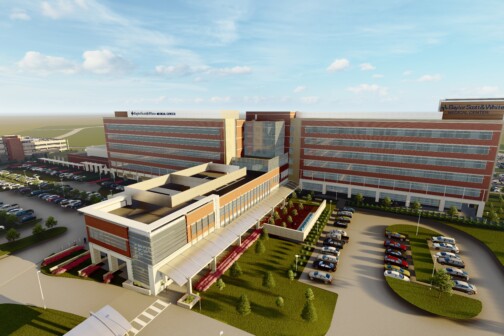Along with hospitals and large pharmacies on the state’s list of vaccination hubs, local providers also signed up to be COVID-19 vaccine distribution sites. After a confusing set of directives from the state about who can receive the vaccine, these clinics and pharmacies have been inundated with calls from patients about being inoculated.
The Moderna version of the vaccine comes in smaller batches and doesn’t require ultra-cold storage, allowing smaller clinics and vaccines to become a distributor. Some of these clinics are giving the vaccine to the general public if they have enough supply.
“The restriction and the constraint in all of this is the dose allocation,” says Jon Roth, the CEO of the Dallas County Medical Society. “We are limited by how much product we can get in the community at one time.”
When Texas Oncology, which has several locations and hundreds of staff members, signed up to be a distributor of the vaccine, the organization was only allocated 100 doses of the vaccine. It wasn’t enough to vaccinate their staff, much less the general public, Roth says. Many clinics and pharmacies have some vaccine, but only enough to vaccinate their staff and associated caregivers, which are categorized by the state as being tier 1A. Though many clinics would like to open things up to their patients, they are limited by supply. Roth says the Dallas County Medical Society received 35,000 doses to distribute to local physicians, a supply he thinks will be used up within the next couple of weeks by providers and their staff alone.
The next challenge, Roth says, will be staffing the expected influx of patients who want the vaccine. CVS and Walgreens are looking to hire a combined 35,000 employees ahead of the vaccine distribution. These nurses, pharmacists, and other healthcare workers will help distribute the vaccine to those in long-term care facilities or senior living centers. Though supply is the current limiting factor, Roth wonders if the local healthcare industry will have enough staff to get through this vaccination. However, he looks ahead to when the vaccine is part of an annual inoculation schedule.
“At some point, we will get into the routine vaccine program as we do for all of our others,” he says. “Is that this year? Is that in three months? Is it next year? We don’t know. That is the golden ticket question.”
In clinics with enough supply to offer it to the public, there is a tension between following the rules that say who is eligible for the vaccine and not wasting it by reserving it. On any given day, appointment cancelations and no-shows mean that there are extra doses that have come to room temperature and have to be used, or they will spoil. Catalyst Health Network Founder and CEO Dr. Chris Crow said he was offered a vaccine when he was visiting a clinic because it would spoil, even though he is not a frontline healthcare worker. He says he suggested that they find someone in the parking lot who could receive it. He explained the clinic thinking in these moments: “We can’t waste it, and we don’t have somebody in front of us, and we have to do it now, so we have to go looking for someone to vaccinate. That’s happening everywhere.”
The clinics want to honor the prioritization schedule put out by the state, but they also don’t want to waste anything, Roth says. At the end of the day, clinics are calling other providers, staff, or potential patients to make sure all the doses are used, and for patients looking for a vaccine, the information is a moving target.
“We’re all doing the best we can follow the rules, but also maximize the resource,” he says.
Roth says that as clinics come to the end of the day and get an idea about how many extra doses they will have, they begin calling patients to receive it or contact other physicians and clinic staff who didn’t have an appointment.
“It is a little bit of a scramble at the end of the day to try and get all those used, so we don’t have any waste whatsoever,” he says. “We all are operating under this no waste-philosophy. Nobody wants to see those thrown in the garbage right now because it is such a scarce resource.”






